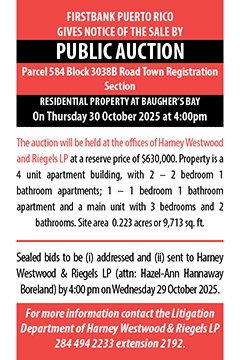Hon Walwyn slams idea of leasing lands in Guyana & DR for food security



Hon Walwyn, during the third podcast episode of The Pulse of the People by the Alliance, on May 23, 2025, said agriculture plays a vital role in building a resilient economy.
“It is one of our oldest and most enduring sectors, feeding families, creating jobs and supplying raw materials.”
He said like tourism, agriculture continues to function without a formal plan.
“Again, I ask you, what kind of caring government allows such a critical industry to languish on life support with no roadmap for survival, especially in times like these?”
Make the investment here, not overseas
Hon Walwyn added that farmers and residents continue to “cry out” for a basic need- a reliable supply of potable water.
He also stated that global tariff wars and supply chain disruptions threaten the VI’s access to imported food while driving prices beyond the reach of ordinary citizens.
“In this climate, the idea of leasing land in Guyana or Santo Domingo to grow food should never be on the minds of our government officials. We need to make an investment in our local agricultural sector,” he said.
In the region, Guyana, Trinidad and Tobago, and Barbados are the most active in leasing land to foreign or private entities for agriculture.
One such example is the Barbados-Guyana Agreement, which includes provisions for Guyana to lease land to Barbados for joint ventures in animal husbandry and poultry rearing.
In 2023, following a visit to Guyana, then Junior Minister for Agriculture and Fisheries Dr the Hon Karl Dawson (R1), had said the government of the VI is thinking about a proposal from Guyana to grow crops on land there.
“The government of Guyana has something to offer. Barbados has land in Guyana that can be used for farming. So it’s not out of the question as we try to find ways to feed ourselves,” Dr Dawson told an August 2023 press meeting in Guyana.
'This is nothing short of absurdity'- Hon Walwyn
Hon Walwyn added, “We need to make an investment in our local agricultural sector.”
He opined that urgent subsidies are needed to revitalise agriculture in the territory.
“This means direct government support to reduce cost, stabilise farmer incomes and stimulate local food production. The time for this is now.”
The Opposition Leader also questioned the prioritising of marijuana cultivation when “we cannot yet grow basic food crops, this is nothing short of absurdity”.
“In the end, a strong economy is about people, it’s about empowering individuals to live with dignity, independence and hope, it ensures every citizen has the chance, not just to survive but to thrive,” Hon Walwyn stated.




















.png)

















27 Responses to “Hon Walwyn slams idea of leasing lands in Guyana & DR for food security”
To put things in context, feeding roughly 35,000 people in the BVI requires on the order of 77 million kilocalories per day (assuming ~2,200 kcal/person/day), or about 28 billion kilocalories per year. In practical terms, if you relied solely on a wheat-equivalent staple you’d need roughly 8,200 metric tons of grain annually (wheat delivers ~3.4 million kcal/ton), and if it were rice you’d be looking at closer to 9,000 tons (rice ~3.1 million kcal/ton). Of course, a balanced diet also includes fruits, vegetables, oils, proteins, and pulses—but even just for cereals, you’d need on the order of 8–10 thousand tons of production each year to hit calorie targets alone.
The Dominican Republic remains vulnerable to hurricanes and periodic flooding, which poses a significant single-event risk to an entire season’s crop. Its volcanic soils and mountainous terrain can be fertile in parts, but they limit the availability of large, contiguous tracts suitable for mechanized farming. By contrast, Guyana lies south of the Caribbean hurricane belt and, while it does experience seasonal riverine flooding, this risk is generally predictable and manageable. Its vast coastal plain is covered in rich alluvial soils, offering thousands of hectares ideal for irrigation, mechanization, and uniform crop management—and at average rice yields of 5 tons per hectare, 2,000 ha in cultivation would generate the roughly 10,000 tons of staple production you need each year.
Logistically, the Dominican Republic has the advantage of proximity—shorter sea transit times translate into fresher produce and lower fuel costs—and a well-developed road and port infrastructure. Guyana, however, is farther away, with longer shipping routes and developing deep-water port capacity. On the agribusiness front, the DR boasts established export industries in cacao, coffee, and plantains, along with experienced cooperatives and suppliers. Guyana’s export sector—centered on rice, sugar, and palm oil—is still scaling infrastructure, but benefits from attractively low land-lease rates and a large, trainable rural workforce.
Given these trade-offs, Guyana clearly edges out the DR when your top priorities are disaster hedging and maximized yield. High-yield rice, maize, and soybean varieties can outperform their DR counterparts by 30–50% per hectare in Guyanese soils. But because the DR offers established value chains and lower shipping costs, a blended strategy—perhaps 70% of volume in Guyana and 30% in the DR—would marry the disaster resilience of Guyana with the logistics flexibility of the Dominican Republic.
To move forward, I’d recommend a two-pronged pilot: secure around 500 ha in Guyana and 200 ha in the DR, partner with local agronomists to test high-yield hybrids, and monitor yields, turnaround times, and costs over an 18-month cycle. From there, you can design a robust supply chain with cold-chain ports in Georgetown and Santo Domingo, multi-modal sea-and-truck transport contracts, and buffer stocks in BVI warehouses. This geographic diversification will both support our local farmers and guarantee the reserve production capacity we need for long-term food security.
All they needed was LAND. No concessions were needed- WE BVI ppl like to hoard and fight over our lands too much sometimes.
The investors just gave up and went away...opportunity lost. now we have to go beg OTHER countries to use their land, mitigate their systems, costs , pests, thieves rats and other challenges. We could have had our OWN.
Sometimes we politicians seem to tout certain themes when politically useful or expedient but do not seem very open or transactional when the real opportunities arise.
JAh
Don't vote for me imma ^%$£ up the city
Next premier loading ………